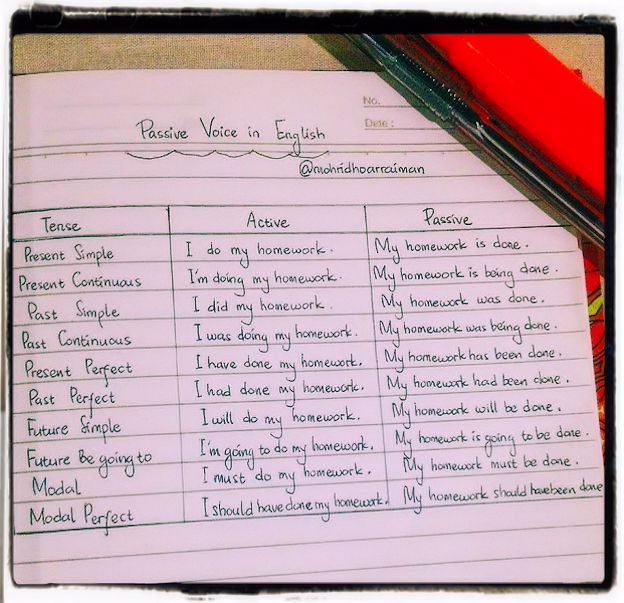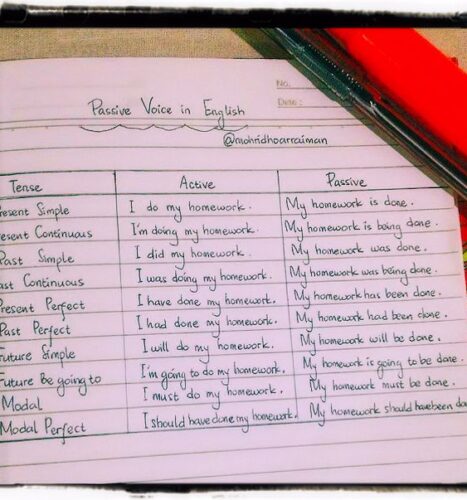
Passive form sentences in English by the world of English with a lot of examples, all the tenses employed, and some advice on scientific and academic writing.
In English, all sentences are in either “active” or “passive” voice: (active): Werner Heisenberg formulated the uncertainty principle in 1927. (passive): The uncertainty principle was formulated by Werner Heisenberg in 1927.
In an active sentence, the person or thing responsible for the action in the sentence comes first. In a passive sentence, the person or thing acted on comes first, and the actor is added at the end, introduced with the preposition “by.” The passive form of the verb is signaled by a form of “to be”: in the sentence above, “was formulated” is in passive voice while “formulated” is in active.
In a passive sentence, we often omit the actor completely: The uncertainty principle was formulated in 1927.
Some examples using the passive form:
(Active) Mary typed the letter on a Macintosh computer. (Passive) The letter was typed on a Macintosh computer.
(Active) Someone is opening the door. (Passive) The door is being opened.
(Active) Someone opened the door. (Passive) The door was opened.
(Active) Someone was opening the door. (Passive) The door was being opened.
(Active) Someone has opened the door. (Passive) The door has been opened.
(Active) Someone should open the door. (Passive) The door should be opened.
(Active) Someone must have opened the door. (Passive) The door must have been opened.
(Active) Mary typed the letter. (Passive) The letter was typed by Mary.
(Active) The instructor will mark your test. (Passive) Your test will be marked by the instructor.
Other examples for the Italian students of English:
Lunch is being served. (Il pranzo viene servito in questo momento).
Steam has been condensed in a small vessel. (Il vapore è stato condensato in un piccolo recipiente).
Dogs are not admitted. (Ai cani non è permesso di entrare).
They can’t see us. / We can’t be seen.
They will open a new restaurant in this area. / A new restaurant will be opened in this area.
We gave Tom a bike for his birthday. / A bike was given to Tom for his birthday or Tom was given a bike for his birthday.
They told her the bad news abruptly. / She was told the bed news abruptly. Or. The bad news was told to her abruptly.
The roof of my house needs repairing. (Il tetto della mia casa ha bisogno di essere riparato).
Your hair wants washing. (I tuoi capelli hanno bisogno di essere lavati).
My new shirt does not iron easily. (La mia nuova camicia non si stira facilmente).
Our goods sell well on the European Market. (La nostra merce si vende bene sul mercato europeo).
(Con i verbi: to open, to close, to wear, to wash, to read, to iron, to sell).
They say the group gave a good performance. / It is said that the group gave a good performance. Or. The group is said to have given a good performance.
Everybody says he’s working extra hard to pay his debts. / It is said he’s working extra hard to pay his dets. Or. He is said to be working extra hard to pay his debts.
They know the famous singer is arriving on Sunday. / It is known that the famous singer is arriving on Saturday. Or. The famous singer is known to be arriving on Sunday.

Active / Passive forms, a complete overview with the different tenses.
Simple Present
(Active) Once a week, Tom cleans the house. (Passive) Once a week, the house is cleaned by Tom.
Present Continuous
(Active) Right now, Sarah is writing the letter. (Passive) Right now, the letter is being written by Sarah.
Simple Past
(Active) Sam repaired the car. (Passive) The car was repaired by Sam.
Past Continuous
(Active) The salesman was helping the customer when the thief came into the store. (Passive) The customer was being helped by the salesman when the thief came into the store.
Present Perfect
(Active) Many tourists have visited that castle. (Passive) That castle has been visited by many tourists.
Present Perfect Continuous
(Active) Recently, John has been doing the work. (Passive) Recently, the work has been being done by John.
Past Perfect
(Active) George had repaired many cars before he received his mechanic’s license. (Passive) Many cars had been repaired by George before he received his mechanic’s license.
Past Perfect Continuous
(Active) Chef Jones had been preparing the restaurant’s fantastic dinners for two years before he moved to Paris. (Passive) The restaurant’s fantastic dinners had been being prepared by Chef Jones for two years before he moved to Paris.
Simple Future
WILL (Active) Someone will finish the work by 5:00 PM. (Passive) The work will be finished by 5:00 PM.
Simple Future
BE GOING TO (Active) Sally is going to make a beautiful dinner tonight. (Passive) A beautiful dinner is going to be made by Sally tonight.
Future Continuous
WILL (Active) At 8:00 PM tonight, John will be washing the dishes. (Passive) At 8:00 PM tonight, the dishes will be being washed by John.
Future Continuous
BE GOING TO (Active) At 8:00 PM tonight, John is going to be washing the dishes. (Passive) At 8:00 PM tonight, the dishes are going to be being washed by John.
Future Perfect
WILL (Active) They will have completed the project before the deadline. (Passive) The project will have been completed before the deadline.
Future Perfect
BE GOING TO (Active) They are going to have completed the project before the deadline. (Passive) The project is going to have been completed before the deadline.
Future Perfect Continuous
WILL (Active) The famous artist will have been painting the mural for over six months by the time it is finished. (Passive) The mural will have been being painted by the famous artist for over six months by the time it is finished.
Future Perfect Continuous
BE GOING TO (Active) The famous artist is going to have been painting the mural for over six months by the time it is finished. (Passive) The mural is going to have been being painted by the famous artist for over six months by the time it is finished.
Used to (Active) Jerry used to pay the bills. (Passive) The bills used to be paid by Jerry.
Would Always (Active) My mother would always make the pies. (Passive) The pies would always be made by my mother.
Future in the Past
WOULD (Active) I knew John would finish the work by 5:00 PM. (Passive) I knew the work would be finished by 5:00 PM.
Future in the Past
WAS GOING TO (Active) I thought Sally was going to make a beautiful dinner tonight. (Passive) I thought a beautiful dinner was going to be made by Sally tonight.

Now we can see the different uses of the passive voice, that is – when do we use the passive voice? – above all in the scientific language and academic writing. Well, in some sentences, passive voice can be perfectly acceptable. You might use it in the following cases:
When the actor is unknown:
The cave paintings of Lascaux were made in the Upper Old Stone Age. (We don’t know who made them.)
When the actor is irrelevant:
An experimental solar power plant will be built in the Australian desert. (We are not interested in who is building it.)
When you want to be vague about who is responsible:
Mistakes were made. (Common in bureaucratic writing!)
When you are talking about a general truth:
Rules are made to be broken. (By whomever, whenever.)
When you want to emphasize the person or thing acted on. For example, it may be your main topic:
Insulin was first discovered in 1921 by researchers at the University of Toronto. It is still the only treatment available for diabetes.
When you are writing in a scientific genre that traditionally relies on passive voice. Passive voice is often preferred in lab reports and scientific research papers, most notably in the Materials and Methods section:
The sodium hydroxide was dissolved in water. This solution was then titrated with hydrochloric acid.
In these sentences you can count on your reader to know that you are the one who did the dissolving and the titrating. The passive voice places the emphasis on your experiment rather than on you.
Note: Over the past several years, there has been a movement within many science disciplines away from passive voice. Scientists often now prefer active voice in most parts of their published reports, even occasionally using the subject “we” in the Materials and Methods section. Check with your instructor or TA whether you can use the first person “I” or “we” in your lab reports to help avoid the passive.
When should we avoid the passive voice?
Passive sentences can get you into trouble in academic writing because they can be vague about who is responsible for the action:
Both Othello and Iago desire Desdemona. She is courted. (Who courts Desdemona? Othello? Iago? Both of them?)
Academic writing often focuses on differences between the ideas of different researchers, or between your own ideas and those of the researchers you are discussing. Too many passive sentences can create confusion:
Research has been done to discredit this theory. (Who did the research? You? Your professor? Another author?)
Some students use passive sentences to hide holes in their research:
The telephone was invented in the nineteenth century. (I couldn’t find out who invented the telephone!)
Finally, passive sentences often sound wordy and indirect. They can make the reader work unnecessarily hard. And since they are usually longer than active sentences, passive sentences take up precious room in your paper:
Since the car was being driven by Michael at the time of the accident, the damages should be paid for by him.
Weeding out passive sentences
If you now use a lot of passive sentences, you may not be able to catch all of the problematic cases in your first draft. But you can still go back through your essay hunting specifically for passive sentences. At first, you may want to ask for help from a writing instructor. The grammar checker in your word processor can help spot passive sentences, though grammar checkers should always be used with extreme caution since they can easily mislead you. To spot passive sentences, look for a form of the verb to be in your sentence, with the actor either missing or introduced after the verb using the word “by”:
Poland was invaded in 1939, thus initiating the Second World War.
Genetic information is encoded by DNA.
The possibility of cold fusion has been examined for many years.
Try turning each passive sentence you find into an active one. Start your new sentence with the actor. Sometimes you may find that need to do some extra research or thinking to figure out who the actor should be! You will likely find that your new sentence is stronger, shorter, and more precise:
Germany invaded Poland in 1939, thus initiating the Second World War.
DNA encodes genetic information.
Physicists have examined the possibility of cold fusion for many years.
For other academic writing advice and a grammar revision for university students and researchers you can visit the following website: https://advice.writing.utoronto.ca/revising/
At the following links you can find a lot of useful and interesting English language material:
Video links to learn good English
Interactive English exercises and tests
Countable and uncountable nouns
The Online English Grammar (Pdf book)
www.daimon.org/education/english/ (Lots of links)
English and International Books
www.liveworksheets.com (All languages)
Free languages courses (All languages)
English Phonetic Symbols with reading examples
https://www.pppst.com/ (Lots of free Ppt)
http://iteslj.org/questions/ (Lots of questions)
www.goethe-verlag.com (Lots of tests)
Improving-bad-grades (Article)
www.perfect-english-grammar.com
https://www.daimon.org/lib/books.htm (Lots of free e-books)
Grammarly: Free Online Writing Assistant
https://epdf.pub/en/ (Lots of free e-books)
www.daimon.org/lib/books.htm (Free books)
www.english-online.org.uk/exam.htm
http://www.englishmedialab.com
https://www.englishexercises.org
http://www.tuneintoenglish.com (Karaoke songs)

